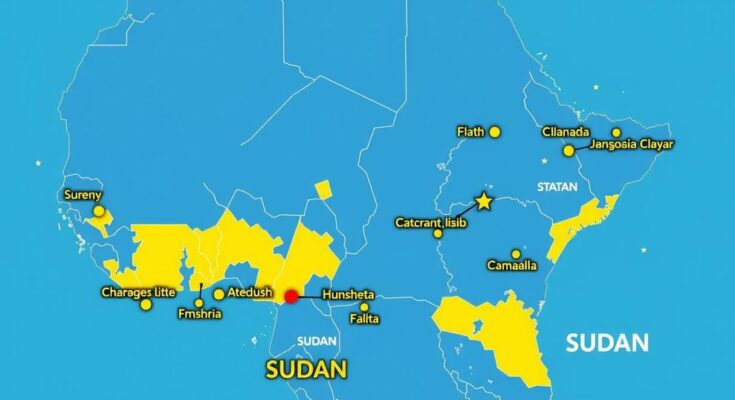Sudan has accused the United Arab Emirates of complicity in genocide due to alleged support for the Rapid Support Forces in the ongoing civil war. The UAE’s interests in Sudan are driven by resource acquisition and strategic influence amidst regional rivalries. The filing at the International Court of Justice raises significant implications for UAE’s international standing, although it dismisses claims as a publicity stunt.
The ongoing civil war in Sudan has led to allegations against the United Arab Emirates (UAE) of complicity in genocide, as stated in a filing at the International Court of Justice (ICJ). Sudan claims the UAE has been supporting the Rapid Support Forces (RSF) in their conflict against the regular army, a charge that the UAE denies.
Sudan is significant to the UAE due to its vast natural resources, including fertile agricultural land and abundant gold, making it the third-largest producer of gold in Africa. Furthermore, Sudan’s strategic location next to Libya and its coastline on the Red Sea signify its importance in oil shipping routes. Political influence in Sudan has been a primary objective for the UAE, as noted by experts on Middle Eastern security.
The UAE has vested interests in Sudan, not just for gold but also to diminish Saudi Arabian influence and counter political Islam, perceived as a security threat. As part of their approach, UAE-affiliated companies regard Sudan as an investment point for resources and minerals, while Sudanese researcher Hamid Khalafallah indicates that the UAE seeks these resources to compensate for its own desert limitations.
Historically, the UAE has cooperated with Sudan’s military during the Yemen conflict alongside Sudanese forces. However, tensions have arisen between the UAE and Saudi Arabia, particularly regarding support for RSF leader Mohamed Hamdan Daglo. The ideological inclinations of the RSF against political Islam align with UAE interests, distinguishing it from the Sudanese army, which retains links to the previous Islamist regime.
Despite ongoing allegations of war crimes from both military factions in Sudan and the RSF’s accusations of genocide, the UAE’s support for the RSF is viewed as substantial by analysts. The UAE has reportedly supplied arms to the RSF, enhancing the group’s military capacity. Nevertheless, UAE officials reject these allegations as unfounded.
Sudan’s filing at the ICJ marks a significant step, claiming UAE complicity in genocide, which the Emirati government has dismissed as mere publicity. Although ICJ decisions are binding, enforcement powers are limited. Analysts believe that while this case may tarnish the UAE’s international reputation, its political and financial stature may mitigate any severe repercussions.
In conclusion, the UAE’s involvement in Sudan highlights complex geopolitical dynamics involving resource acquisition, ideological conflicts, and regional influence. Accusations of genocide against the UAE related to its support for the RSF may impact its global image, yet the nation’s economic and political clout could shield it from far-reaching consequences. The ongoing situation deserves close observation as it evolves within the broader context of the Middle East’s geopolitical landscape.
Original Source: www.ndtv.com




